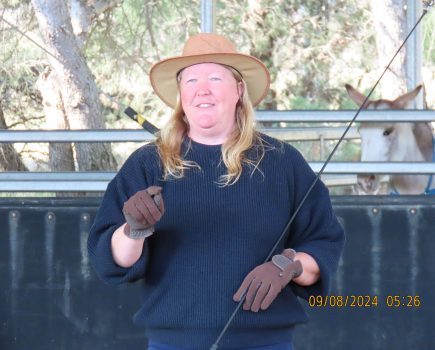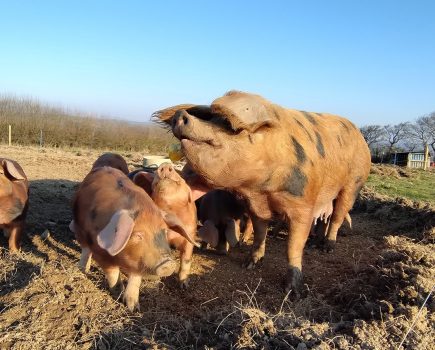One gets going, then the other takes up the challenge.

I had one hen, Florrie, who decided to stop wanting to sit, of her own accord, and immediately another fell broody. Currently my little Ayam Cemani is sitting firmly and hoarding any eggs that get laid in a row of three nest boxes. She will change her nest according to where the eggs are. She is a pecker too – if my hand goes anywhere near her, I get a vicious and sharp little peck! But I do not want any chicks – at this time of year it is still far too cold. Also I can’t really have any more hens at the moment – I have far too many and no room for any more. What to do? But at least this is a feel-good time of year with all the summer months still ahead and lots of eggs are already coming in.


Fact file:

Ayam Cemanis
There was a bit of a craze for Ayam Cemanis a couple of years and I managed to pick up two hens in Salisbury Market. This unusual breed hails from Java in Indonesia and was introduced into Europe in the 70s by a Dutch breeder. I lost one of my Ayam Cemanis last year; unfortunately she disappeared after wandering too far across the field and I think a fox must have taken her. But my remaining Ayam Cemani, called Elly, is much treasured. She is black all over, inside and out. These black birds have excess pigmentation which causes something called fibromelanosis. Ayam Cemanis are meant to be poor layers and non-sitters but my little one, as mentioned above, is broody at the moment and she went broody a few times last year as well!
The laying season
A hen naturally has a laying season from late January to September or October. A hen will usually come back into lay when the days start lengthening – this can be late January or early February. She will lay about 40 to 50% of the maximum (taking 100% as the maximum of one egg per day); this will rise fast to about 80% by April and May. These are the peak months but this is also the natural time for a hen to go broody. If she doesn’t go broody, production will reduce to between 60 or 70% in July and August, with the moult arriving in September or October. The best layers tend to be late to come into moult.
Bird flu impact on auction
It is a great pity that Salisbury Market has not run its monthly rare breed auction for a year now and there are no plans to run it this year. The problem is that there is still a risk of a serious outbreak of bird flu that threatens us all over Britain. For this reason the poultry sale cannot take place as the disease could quickly spread with so many different birds gathered together in one place. It used to be a very popular event and well-respected breeders from all over the country would bring their birds to auction.
Photogenic hens
One of my Fayoumi crosses, Lacey, is particularly photogenic and likes to fly up high if she can. Here she is on the pergola.
My hens looking good under the leafless beech hedge which is not offering much shelter at the moment.
Charlotte shares a tip
Beware of scaly leg mite
This can quickly affect all your hens as it is very contagious. So even if only one of your hens has the mite, it is a good idea to treat all your hens. The scaly leg mite lives under the scales of the bird’s leg. The mite may originate from the litter on the floor of your hen house. The scales on the legs become rough, and a chalk-like concretion is formed, which accumulates both between and over the scales. It is intensely irritating to the bird and once developed may make the bird lame and unable to perch. The problem is relatively easy to cure and there are several different treatments that can be tried. Surgical spirit can be painted on the legs with a small paintbrush once a week for five weeks and is usually effective. However there are some relatively new products on the market. Net-tex is an innovative product, costing around £5.99 which contains a mixture of natural oils and repellents. You spray the legs with a liquid which should protect the legs from further mite as well as providing relief from the irritation the bird is experiencing in the affected areas.
Image(s) provided by:
Archant
Archant
Archant
Archant







